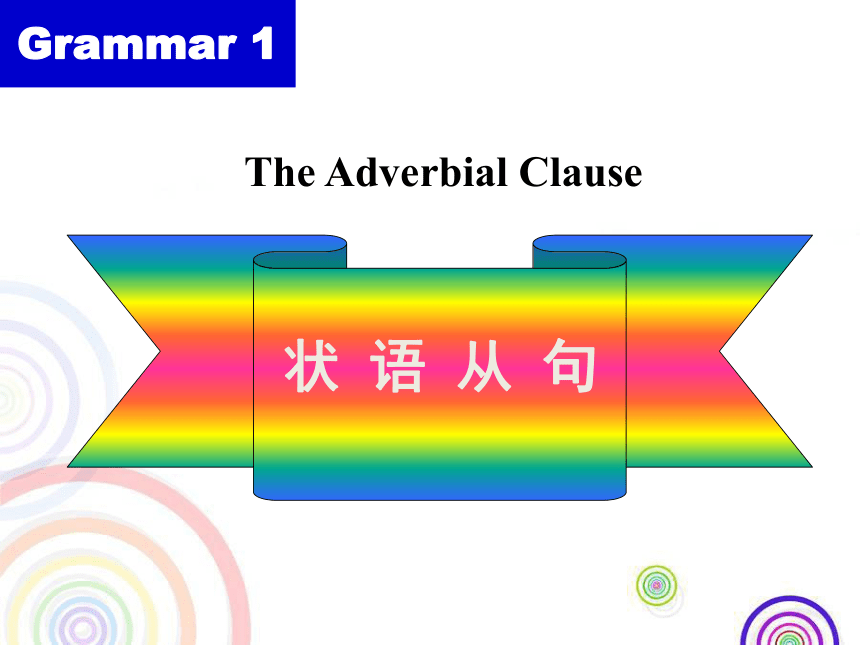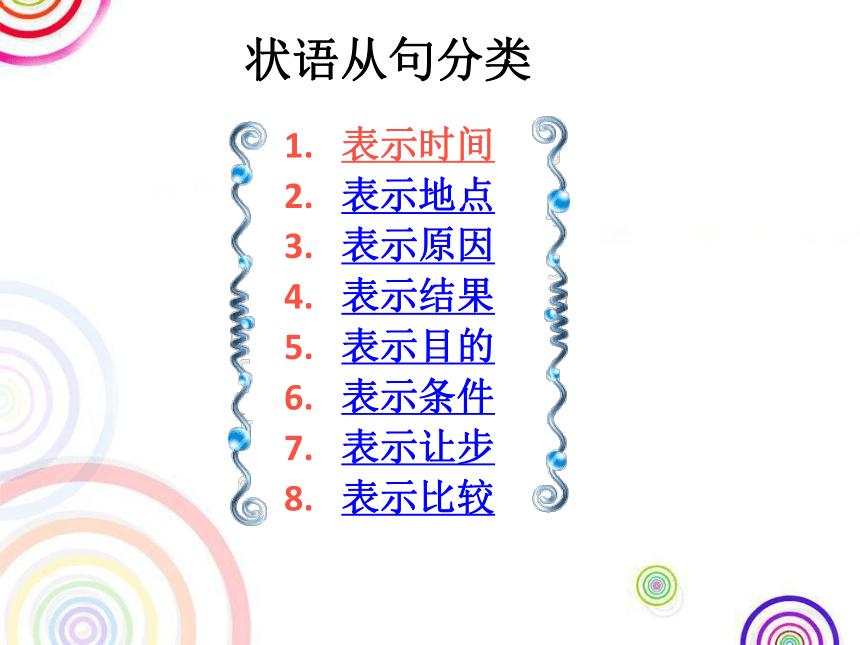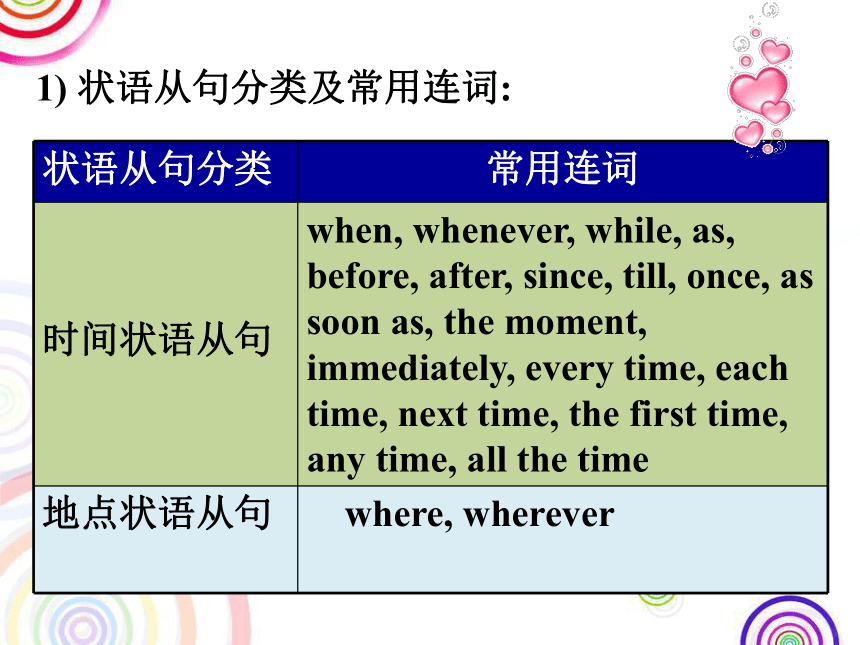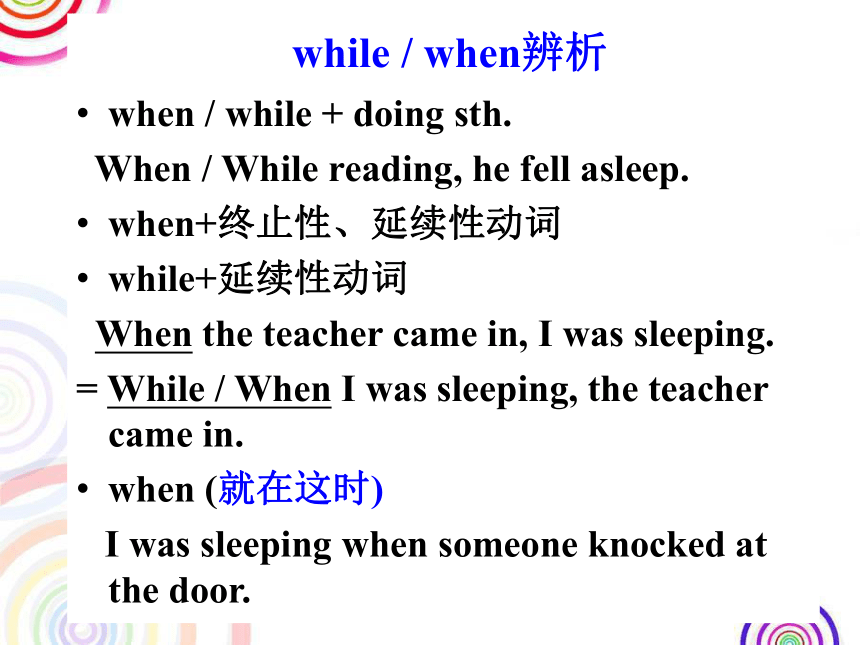Module 7 Engiish for you and me Unit3 Language in use 教学课件
文档属性
| 名称 | Module 7 Engiish for you and me Unit3 Language in use 教学课件 |

|
|
| 格式 | zip | ||
| 文件大小 | 697.2KB | ||
| 资源类型 | 教案 | ||
| 版本资源 | 外研版 | ||
| 科目 | 英语 | ||
| 更新时间 | 2015-05-10 00:00:00 | ||
图片预览












文档简介
课件60张PPT。Unit 3 Language in useModule 7It’s also the subject that I’m best at, although my spoken English is not that good.
I can speak English with you whenever we meet.
As China continues to grow, many people think that Chinese will become as common as English by the middle of the twenty-first century.Read these sentences and analyze their structure. Grammar 1状 语 从 句The Adverbial Clause什么是状语从句?用一个句子充当状语成分,那个句子就是
状语从句。引导状语从句的关联词是一些
从属连词。 I get upat sixwhen it is dark.I get upat schoolwhere I study.状语从句分类表示时间
表示地点
表示原因
表示结果
表示目的
表示条件
表示让步
表示比较1) 状语从句分类及常用连词: while / when辨析
when / while + doing sth.
When / While reading, he fell asleep.
when+终止性、延续性动词
while+延续性动词
When the teacher came in, I was sleeping.
= While / When I was sleeping, the teacher came in.
when (就在这时)
I was sleeping when someone knocked at the door.as 当…时;一边…一边;随着……*某事一发生,另一事立即发生
*两个动作同时发生As the day went on, the weather got
worse.As the captain passed me, I asked him whether there was any hope of saving the ship.★ as的常见用法:
1. She sang as she worked.
一边……一边……
2. You must try to do as I did.
像…..一样
3. As she was late for class, she had to say sorry.
由于 before 用作连词时,意思是“在……之前;还没来得及 …… 就”。
Before she could move, she heard a great
noise.
She had rushed out of the room before I
could say a word.在It + be + 时间段 + before ...句型中,意思是“在……之后才……”。
It will be half a year before I come back.
在It + be + not + 时间段 + before ...句型中,意思是“不多久……就……”。
It won’t be long before they understand each other. till, until和not … until
1.until / till引导时间状语从句用于肯定句时,主句的动词是延续性动词,表示动作或状态一直持续到until / till所表示的时间,意为“某动作一直延续到某时间点才停止”。如:
We waited until he came.
2. 用于否定句时, 主句谓语动词是非延续性动词, 从句为肯定, 意为“某动作直到某时间才开始”。如: He won’t go to bed till / until she returns.
3.till不可以置于句首,而until可以。如:
Until you told me I had no idea of it.1.?__________ he comes here tomorrow, I will call you.
2.?____________ he was walking in the street, he met Tim.
3.?She sang _________ she worked.
4.?There was an applause ____________ she appeared on the stage.练一练WhenWhile/Whenasas soon as5.It won’t be long ______he finishes his writing.
6.______ he had finished his work, he left there.
7.It is two years ______he came here.
8.??_______she told me, I had no idea of what they had said.beforeAftersinceUntilso that, so…that, such…that so that “以便”、“结果”表目的和结果。
注意:在从句中有情态动词表目的,无情态动词表结果。
so…that “如此…以致于”表结果, 该结构常见于:
1. so+形/副+that从句 2. so+形+a(an)+单数名词+that从句 3. so+many / much+复数名词(不可数名词)+that从句so that, so…that, such…that such…that “如此…以致于”表结果,该结构常见于:
1. such+a(an)+形+名词+that从句 2. such+形+复数名词/不可数名词+that从句He is so young that he can’t go to work.
他这么小他不能上班。
They are hurrying so that they may not miss
the train.
他们为了赶上火车而匆匆忙忙。
It’s such a good chance that we mustn’t miss it. 机会这样好,我们决不能失掉。1. It is _____ good a story that I’ll never forget it.
2. It is ______ a good story that I’ll never forget it.
3. They set out early ________ they might arrive there in time. sosuch练一练so thatthough, although在句首表“尽管”两者都可以用,但句后不能再用but。
下列情况只能用though: ▲ as though (=as if);
even if (=even though) ▲ 在句末表示“然而”
as表示“尽管”,从句的表语、状语等成分要倒装。 though, although, as, 2)状语从句的时态需要考虑时态问题的状语从句一般是指时间和条件状语从句。主句如果是一般将来时或过去将来时,条件和时间状语从句一般用一般现在时或一般过去式。I didn’t realize how special my mother was until I became an adult.
While John was watching TV, his wife was cooking.
Every time I listen to your advice, I get into trouble.
We’ll start our project if the president agrees. Complete these sentences.Many Confucius Institutes have been set
up around the world ________ more and more people want to learn Chinese.
2. French was more popular _________
English became important in the
nineteenth century.
3. I will make great progress ________ you
help me learn English.after although because before if
so that so … that when whilewhose classes areseveral of hisinteresting and creative14. Tony finds writing Chinese really difficult,
________ he can understand and speak
Chinese pretty well.
5. English spread more quickly all over the
world _______ television was invented.
6. I advise you to go to an English corner _____
you can improve your listening and speaking.which / that shewho wouldcan dance to7. English has become ________ important in
international communication ________
schools in China and many other countries
teach the language.
8. In order to improve his English, my uncle
took every chance to talk to people in
Australia _________ he was working there.
9. I started learning English _________ I was
seven years old, right on my birthday.that / which is made of silkwho / that talksmuch but never does anythingmuch but never does anything【2010成都中考】I won’t be able to understand
what you say, _______ you speak too quickly.
A. if B. though C. because
【2010湖北?荆州】24. —Why didn’t Betty come
to school yesterday?
—_________ she was ill.
A. But B. Though
C. If D. BecauseCD【2010甘肃.定西】She had a stomachache _______ she ate something bad.
A. so B. because
C. or D. although
【2011福建莆田】—Why do you like this TV program?
—_________ it’s very interesting and exciting.
A. Though B. Because C. SoBB【 2012湖北荆州】 — When shall we leave for China?
— We won’t we have visited all the places of interest here.
A. until B. while
C. as D. since
【2012江苏淮安】______ the great teacher Zhang Lili was in hospital, many people hoped she would get better soon.
A. If B. Until
C. Before D. AfterAD【2012湖北十堰】________ he is only 12, he
often goes to the old people’s home to perform
plays for the old people as a volunteer.
A. If B. Since C. Though D. Because
【2012江西】______ the girl is only nine, she
takes care of her brother and cooks meals
every day.
A. If B. Because
C. Although D. AsCC【2012山东泰安】Tigers wait_______ it is dark, then go out to find their food.
A. since B. until
C. as D. Because
【2012浙江宁波】—Why didn't you try your best to get on the subway?
—I tried to, but it started moving _______ I could get on it.
A. before B. after
C. since D. ifBA【2012绵阳市】________ I was in the US, I made a lot of American friends.
A. While B. Although
C. Unless D. Until
【2012江苏宿迁】Eddie was sleeping _____ Millie was reading a magazine.
A. until B. while
C. before D. afterAB【2012广西玉林】______ he exercises every day, ______ he is very healthy.
A. Because; so
B. Because; through
C. Because; /
D. Though; /
A【2013湖北宜昌】—______ is the street crowded with so many people?
—Because they are waiting to watch the boat races.
A. Why B. Where C. How D. WhoA【2013 浙江湖州】20. —How do you like
the sport play?
— Funny, _______ the music of it is not so good.
A. so B. though C .or D. because
【2013 湖北恩施】 _______ our teacher is
ill, _______ he still comes to our class to
teach us.
A. though; but B. Though; /
C. Although; butBB【2013湖南长沙】—It’s too late. I have to go now.
—Oh, it’s raining outside. Don’t leave _______ it stops.
A.since B.until C.While
【2013浙江丽水】 —Hey, man. You can’t cross the street now. You have to wait ______ the traffic turn green.
—Oh, sorry and thank you.
A. when B. after
C. until D. whileBC【2013年黑龙江大庆】He puts the flowers in the shade ________the sun will not burn them.
A. in order to B. so that
C. so as to D. such that
【2013年贵州贵阳】Teresa is ________ nervous ________ she can't talk in front of the class.
A. such; that B. too; to C. so; thatBC【2013山东菏泽】 ________ the children have fun, parents can take dance lessons on the beach.
A. When B. If
C. While D. Once
【2013浙江杭州】Sally took a photo of her friends while they _______ computer games.
A. play B. are playing
C. have played D. were playingCD【2013江苏徐州】Millie ________ a picture when Mr Green came in.
A. draw B. will draw
C. drew D. was drawing
【2013陕西】When you ________ at a restaurant, please order just enough food.
A. ate B. will eat
C. eat D. haven eaten DC【2013河北】Henry will give us a report as soon as he_____.
A. arrives B. arrived
C. is arriving D. will arrive
【2013湖南长沙】When Jim’s mother came in, he _____ his homework.
A. is doing
B. has done
C. was doing
ACI hope I can continue to make progress next year.
The British, the Indians and the Chinese all help (to) make it a rich language.Read these sentences and pay attention to the colored words.ReviewGrammar 2动词不定式
Infinitive当我们要表示“想做某事、需要做某事或决定做某事”时,就会出现两个动词连用的情况,这时应如何表达呢?同学们自然会想到 want to do sth., need to
do sth.和 decide to do sth. 等表达方式。 主要行为动词后面的动词都采用了“to+动词原形”的结构,我们把这种结构称为动词不定式(有时可以不带to)。动词不定式没有人称和数的变化,在句子中不能作谓语。下面我们一起来看一下动词不定式有哪些语法功能。1. 什么是动词不定式?1). 不定式作主语
不定式作主语时,常用it作形式主语,而将作主语的不定式放在句子后部。
It is good to help others.
帮助他人是件好事。
It is exciting to surf the Internet.
上网是件令人兴奋的事。 2. 动词不定式的语法功能2). 不定式作宾语
学习不定式作宾语时, 要注意掌握后接不定式
作宾语的动词。常见动词有: want, hope, wish,
like, begin, try, need, forget, agree, help 等。
Many people decide not to think about it.
许多人决定不去想这件事。
I want to go to the library.
我想去图书馆。 1、有些动词后面既可接不定式、又可接动名词,其意义基本相同、区别不大。如:like, love, hate, prefer, begin, start。
2、有些词后面既可以接不定式、也可接动名词,但意义有很大区别,须特别注意:
stop to do 停下来做另一件事
stop doing 停止做……
try to do 努力、试图做……
try doing 试着做……
forget to do sth. 忘记要做某事
forget doing sth. 忘记已经做了某事
remember to do sth. 记住要做某事
remember doing sth. 记得做过某事3). 不定式作定语
不定式修饰名词或代词,起形容词的作用,在句中作定语,放在被修饰对象的后面,请看下列句子:
I have a lot of homework to do.
我有很多作业要做。
I’m hungry. Give me something to eat, please.
我饿了, 请给我点吃的吧。4). 不定式作状语
不定式常常作目的状语、原因状语、结果状语等。不定式作状语时,要注意不定式的逻辑主语应与句子的主语保持一致。
I came to Beijing to see my grandpa.
我来北京看望我爷爷。
I’m glad to meet you!很高兴见到你!
I’m too tired to walk.
我太累了,走不动了。5). 不定式作补语
She told me to buy a ticket.
她让我去买张票。
6). 不定式作表语
Our duty today is to clean the floor.
今天我们的任务是扫地。Complete the sentences with the correct
form of the words in brackets.Many people want ________ (study) English
so they can get a good job.
2. I asked my teacher ________ (give) me some
extra English homework.
3. You need _________ (practise) speaking
every day if you want to improve your spoken
English.
4. Jenny learnt _________ (speak) English well
while she was in Canada.
5. English is easy ________ (learn) if you
practise and revise every day.to studyto give(to) practiseto speakto learn2Work in pairs. Read the remarks and
answer the questions.Who has done very well at school?
What does Ned need to do in order to get better at handwriting?
What does Toby enjoy? Does he like
schoolwork as much as this, or less than this?
Meg has done very well at school. He needs to practise for a few minutes every day.Toby enjoys sport. He likes schoolwork
less than sport.3Complete the conversation with the
correct form of the words in brackets.Answers:
requires 2. (to) practise
3. improve 4. to achieve
5. written 6. (to) spread
7. spoken4 Choose the best answer.
1. -- The light in the office is still on.
-- Oh, I forgot ______.
A. turning it off B. turn it off
C. having turned it off
D. to turn it off
2. She can’t help ______ the house because
she’s busy making a cake.
A. to clean B. cleaning
C. cleaned D. being cleaned3. Not everybody has the ability_____ in
public.
A. of speak B. speaking
C. spoken D. to speak
4. Mary is always the first student _____ to
answer the teacher’s questions in class.
A. rising B. to rise
C. rose D. risen5. -- Mum, why do you always ask me to eat
an egg every day?
-- ______ enough protein and nutrition as
you are growing up.
A. Get B. Getting
C. To get D. To be getting
6. -- Would you be so kind _____ us out?
-- With pleasure.
A. helping B. in helping
C. help D. as to help7. Wet umbrellas are not allowed _____ into
this hotel according to the rule.
A. to be taken B. to take
C. taken D. taking
8. Robert is said _____ abroad, but I didn’t
know what country he studied in.
A. to have studied
B. to study
C. to be studying
D. to have been studying9. In Australia he made a lot of friends _____
a very practical knowledge of English.
A. get B. getting
C. to get D. got
The patient was warned _____ oily food
after the operation.
A. to eat not B. eating not
C. not to eat D. not eating【2013广东广州】17. I always tell my students ______ on the road because it’s really dangerous.
A. not to play B. to play not
C. not playing D. not play
【解析】考查非谓语动词。不定式做tell的宾语补足语,构成tell sb. to do sth.结构,对不定式进行否定在to前加not。即tell sb. not to do sth.意为“告诉某人不要做某事”。【2013广东】41. —I didn’t hear you come in just now.
— That’s good. We tried _______ any noise, for you were sleeping.
A. not make B. not to make
C. to make D. making
【解析】考查非谓语动词的用法。try to do sth.意为“努力/尽力做某事”,否定式为 try not to do sth.,句意指尽量不去制造任何噪音。所以选择答案 B。【2013山东济南】52. It was time for class. Mr. King asked all the children _______ down quietly.
A. sit B. sat
C. to sit D. sitting
【解析】选C。考查非谓语动词。句中动词为ask,后接动词不定式作宾语补足语,即ask sb. to do sth.“要求某人做某事”。所以答案选C。【2013浙江杭州】24. She’s not strong enough ________ walking up mountains.
A. to go B. going
C. go D. went
【解析】本题考查非谓语动词。不定式to go做结果状语,由句意“她的年龄还没足够达到去爬山的地步”。be … enough to do sth. 是固定句型,足够……去做某事。
I can speak English with you whenever we meet.
As China continues to grow, many people think that Chinese will become as common as English by the middle of the twenty-first century.Read these sentences and analyze their structure. Grammar 1状 语 从 句The Adverbial Clause什么是状语从句?用一个句子充当状语成分,那个句子就是
状语从句。引导状语从句的关联词是一些
从属连词。 I get upat sixwhen it is dark.I get upat schoolwhere I study.状语从句分类表示时间
表示地点
表示原因
表示结果
表示目的
表示条件
表示让步
表示比较1) 状语从句分类及常用连词: while / when辨析
when / while + doing sth.
When / While reading, he fell asleep.
when+终止性、延续性动词
while+延续性动词
When the teacher came in, I was sleeping.
= While / When I was sleeping, the teacher came in.
when (就在这时)
I was sleeping when someone knocked at the door.as 当…时;一边…一边;随着……*某事一发生,另一事立即发生
*两个动作同时发生As the day went on, the weather got
worse.As the captain passed me, I asked him whether there was any hope of saving the ship.★ as的常见用法:
1. She sang as she worked.
一边……一边……
2. You must try to do as I did.
像…..一样
3. As she was late for class, she had to say sorry.
由于 before 用作连词时,意思是“在……之前;还没来得及 …… 就”。
Before she could move, she heard a great
noise.
She had rushed out of the room before I
could say a word.在It + be + 时间段 + before ...句型中,意思是“在……之后才……”。
It will be half a year before I come back.
在It + be + not + 时间段 + before ...句型中,意思是“不多久……就……”。
It won’t be long before they understand each other. till, until和not … until
1.until / till引导时间状语从句用于肯定句时,主句的动词是延续性动词,表示动作或状态一直持续到until / till所表示的时间,意为“某动作一直延续到某时间点才停止”。如:
We waited until he came.
2. 用于否定句时, 主句谓语动词是非延续性动词, 从句为肯定, 意为“某动作直到某时间才开始”。如: He won’t go to bed till / until she returns.
3.till不可以置于句首,而until可以。如:
Until you told me I had no idea of it.1.?__________ he comes here tomorrow, I will call you.
2.?____________ he was walking in the street, he met Tim.
3.?She sang _________ she worked.
4.?There was an applause ____________ she appeared on the stage.练一练WhenWhile/Whenasas soon as5.It won’t be long ______he finishes his writing.
6.______ he had finished his work, he left there.
7.It is two years ______he came here.
8.??_______she told me, I had no idea of what they had said.beforeAftersinceUntilso that, so…that, such…that so that “以便”、“结果”表目的和结果。
注意:在从句中有情态动词表目的,无情态动词表结果。
so…that “如此…以致于”表结果, 该结构常见于:
1. so+形/副+that从句 2. so+形+a(an)+单数名词+that从句 3. so+many / much+复数名词(不可数名词)+that从句so that, so…that, such…that such…that “如此…以致于”表结果,该结构常见于:
1. such+a(an)+形+名词+that从句 2. such+形+复数名词/不可数名词+that从句He is so young that he can’t go to work.
他这么小他不能上班。
They are hurrying so that they may not miss
the train.
他们为了赶上火车而匆匆忙忙。
It’s such a good chance that we mustn’t miss it. 机会这样好,我们决不能失掉。1. It is _____ good a story that I’ll never forget it.
2. It is ______ a good story that I’ll never forget it.
3. They set out early ________ they might arrive there in time. sosuch练一练so thatthough, although在句首表“尽管”两者都可以用,但句后不能再用but。
下列情况只能用though: ▲ as though (=as if);
even if (=even though) ▲ 在句末表示“然而”
as表示“尽管”,从句的表语、状语等成分要倒装。 though, although, as, 2)状语从句的时态需要考虑时态问题的状语从句一般是指时间和条件状语从句。主句如果是一般将来时或过去将来时,条件和时间状语从句一般用一般现在时或一般过去式。I didn’t realize how special my mother was until I became an adult.
While John was watching TV, his wife was cooking.
Every time I listen to your advice, I get into trouble.
We’ll start our project if the president agrees. Complete these sentences.Many Confucius Institutes have been set
up around the world ________ more and more people want to learn Chinese.
2. French was more popular _________
English became important in the
nineteenth century.
3. I will make great progress ________ you
help me learn English.after although because before if
so that so … that when whilewhose classes areseveral of hisinteresting and creative14. Tony finds writing Chinese really difficult,
________ he can understand and speak
Chinese pretty well.
5. English spread more quickly all over the
world _______ television was invented.
6. I advise you to go to an English corner _____
you can improve your listening and speaking.which / that shewho wouldcan dance to7. English has become ________ important in
international communication ________
schools in China and many other countries
teach the language.
8. In order to improve his English, my uncle
took every chance to talk to people in
Australia _________ he was working there.
9. I started learning English _________ I was
seven years old, right on my birthday.that / which is made of silkwho / that talksmuch but never does anythingmuch but never does anything【2010成都中考】I won’t be able to understand
what you say, _______ you speak too quickly.
A. if B. though C. because
【2010湖北?荆州】24. —Why didn’t Betty come
to school yesterday?
—_________ she was ill.
A. But B. Though
C. If D. BecauseCD【2010甘肃.定西】She had a stomachache _______ she ate something bad.
A. so B. because
C. or D. although
【2011福建莆田】—Why do you like this TV program?
—_________ it’s very interesting and exciting.
A. Though B. Because C. SoBB【 2012湖北荆州】 — When shall we leave for China?
— We won’t we have visited all the places of interest here.
A. until B. while
C. as D. since
【2012江苏淮安】______ the great teacher Zhang Lili was in hospital, many people hoped she would get better soon.
A. If B. Until
C. Before D. AfterAD【2012湖北十堰】________ he is only 12, he
often goes to the old people’s home to perform
plays for the old people as a volunteer.
A. If B. Since C. Though D. Because
【2012江西】______ the girl is only nine, she
takes care of her brother and cooks meals
every day.
A. If B. Because
C. Although D. AsCC【2012山东泰安】Tigers wait_______ it is dark, then go out to find their food.
A. since B. until
C. as D. Because
【2012浙江宁波】—Why didn't you try your best to get on the subway?
—I tried to, but it started moving _______ I could get on it.
A. before B. after
C. since D. ifBA【2012绵阳市】________ I was in the US, I made a lot of American friends.
A. While B. Although
C. Unless D. Until
【2012江苏宿迁】Eddie was sleeping _____ Millie was reading a magazine.
A. until B. while
C. before D. afterAB【2012广西玉林】______ he exercises every day, ______ he is very healthy.
A. Because; so
B. Because; through
C. Because; /
D. Though; /
A【2013湖北宜昌】—______ is the street crowded with so many people?
—Because they are waiting to watch the boat races.
A. Why B. Where C. How D. WhoA【2013 浙江湖州】20. —How do you like
the sport play?
— Funny, _______ the music of it is not so good.
A. so B. though C .or D. because
【2013 湖北恩施】 _______ our teacher is
ill, _______ he still comes to our class to
teach us.
A. though; but B. Though; /
C. Although; butBB【2013湖南长沙】—It’s too late. I have to go now.
—Oh, it’s raining outside. Don’t leave _______ it stops.
A.since B.until C.While
【2013浙江丽水】 —Hey, man. You can’t cross the street now. You have to wait ______ the traffic turn green.
—Oh, sorry and thank you.
A. when B. after
C. until D. whileBC【2013年黑龙江大庆】He puts the flowers in the shade ________the sun will not burn them.
A. in order to B. so that
C. so as to D. such that
【2013年贵州贵阳】Teresa is ________ nervous ________ she can't talk in front of the class.
A. such; that B. too; to C. so; thatBC【2013山东菏泽】 ________ the children have fun, parents can take dance lessons on the beach.
A. When B. If
C. While D. Once
【2013浙江杭州】Sally took a photo of her friends while they _______ computer games.
A. play B. are playing
C. have played D. were playingCD【2013江苏徐州】Millie ________ a picture when Mr Green came in.
A. draw B. will draw
C. drew D. was drawing
【2013陕西】When you ________ at a restaurant, please order just enough food.
A. ate B. will eat
C. eat D. haven eaten DC【2013河北】Henry will give us a report as soon as he_____.
A. arrives B. arrived
C. is arriving D. will arrive
【2013湖南长沙】When Jim’s mother came in, he _____ his homework.
A. is doing
B. has done
C. was doing
ACI hope I can continue to make progress next year.
The British, the Indians and the Chinese all help (to) make it a rich language.Read these sentences and pay attention to the colored words.ReviewGrammar 2动词不定式
Infinitive当我们要表示“想做某事、需要做某事或决定做某事”时,就会出现两个动词连用的情况,这时应如何表达呢?同学们自然会想到 want to do sth., need to
do sth.和 decide to do sth. 等表达方式。 主要行为动词后面的动词都采用了“to+动词原形”的结构,我们把这种结构称为动词不定式(有时可以不带to)。动词不定式没有人称和数的变化,在句子中不能作谓语。下面我们一起来看一下动词不定式有哪些语法功能。1. 什么是动词不定式?1). 不定式作主语
不定式作主语时,常用it作形式主语,而将作主语的不定式放在句子后部。
It is good to help others.
帮助他人是件好事。
It is exciting to surf the Internet.
上网是件令人兴奋的事。 2. 动词不定式的语法功能2). 不定式作宾语
学习不定式作宾语时, 要注意掌握后接不定式
作宾语的动词。常见动词有: want, hope, wish,
like, begin, try, need, forget, agree, help 等。
Many people decide not to think about it.
许多人决定不去想这件事。
I want to go to the library.
我想去图书馆。 1、有些动词后面既可接不定式、又可接动名词,其意义基本相同、区别不大。如:like, love, hate, prefer, begin, start。
2、有些词后面既可以接不定式、也可接动名词,但意义有很大区别,须特别注意:
stop to do 停下来做另一件事
stop doing 停止做……
try to do 努力、试图做……
try doing 试着做……
forget to do sth. 忘记要做某事
forget doing sth. 忘记已经做了某事
remember to do sth. 记住要做某事
remember doing sth. 记得做过某事3). 不定式作定语
不定式修饰名词或代词,起形容词的作用,在句中作定语,放在被修饰对象的后面,请看下列句子:
I have a lot of homework to do.
我有很多作业要做。
I’m hungry. Give me something to eat, please.
我饿了, 请给我点吃的吧。4). 不定式作状语
不定式常常作目的状语、原因状语、结果状语等。不定式作状语时,要注意不定式的逻辑主语应与句子的主语保持一致。
I came to Beijing to see my grandpa.
我来北京看望我爷爷。
I’m glad to meet you!很高兴见到你!
I’m too tired to walk.
我太累了,走不动了。5). 不定式作补语
She told me to buy a ticket.
她让我去买张票。
6). 不定式作表语
Our duty today is to clean the floor.
今天我们的任务是扫地。Complete the sentences with the correct
form of the words in brackets.Many people want ________ (study) English
so they can get a good job.
2. I asked my teacher ________ (give) me some
extra English homework.
3. You need _________ (practise) speaking
every day if you want to improve your spoken
English.
4. Jenny learnt _________ (speak) English well
while she was in Canada.
5. English is easy ________ (learn) if you
practise and revise every day.to studyto give(to) practiseto speakto learn2Work in pairs. Read the remarks and
answer the questions.Who has done very well at school?
What does Ned need to do in order to get better at handwriting?
What does Toby enjoy? Does he like
schoolwork as much as this, or less than this?
Meg has done very well at school. He needs to practise for a few minutes every day.Toby enjoys sport. He likes schoolwork
less than sport.3Complete the conversation with the
correct form of the words in brackets.Answers:
requires 2. (to) practise
3. improve 4. to achieve
5. written 6. (to) spread
7. spoken4 Choose the best answer.
1. -- The light in the office is still on.
-- Oh, I forgot ______.
A. turning it off B. turn it off
C. having turned it off
D. to turn it off
2. She can’t help ______ the house because
she’s busy making a cake.
A. to clean B. cleaning
C. cleaned D. being cleaned3. Not everybody has the ability_____ in
public.
A. of speak B. speaking
C. spoken D. to speak
4. Mary is always the first student _____ to
answer the teacher’s questions in class.
A. rising B. to rise
C. rose D. risen5. -- Mum, why do you always ask me to eat
an egg every day?
-- ______ enough protein and nutrition as
you are growing up.
A. Get B. Getting
C. To get D. To be getting
6. -- Would you be so kind _____ us out?
-- With pleasure.
A. helping B. in helping
C. help D. as to help7. Wet umbrellas are not allowed _____ into
this hotel according to the rule.
A. to be taken B. to take
C. taken D. taking
8. Robert is said _____ abroad, but I didn’t
know what country he studied in.
A. to have studied
B. to study
C. to be studying
D. to have been studying9. In Australia he made a lot of friends _____
a very practical knowledge of English.
A. get B. getting
C. to get D. got
The patient was warned _____ oily food
after the operation.
A. to eat not B. eating not
C. not to eat D. not eating【2013广东广州】17. I always tell my students ______ on the road because it’s really dangerous.
A. not to play B. to play not
C. not playing D. not play
【解析】考查非谓语动词。不定式做tell的宾语补足语,构成tell sb. to do sth.结构,对不定式进行否定在to前加not。即tell sb. not to do sth.意为“告诉某人不要做某事”。【2013广东】41. —I didn’t hear you come in just now.
— That’s good. We tried _______ any noise, for you were sleeping.
A. not make B. not to make
C. to make D. making
【解析】考查非谓语动词的用法。try to do sth.意为“努力/尽力做某事”,否定式为 try not to do sth.,句意指尽量不去制造任何噪音。所以选择答案 B。【2013山东济南】52. It was time for class. Mr. King asked all the children _______ down quietly.
A. sit B. sat
C. to sit D. sitting
【解析】选C。考查非谓语动词。句中动词为ask,后接动词不定式作宾语补足语,即ask sb. to do sth.“要求某人做某事”。所以答案选C。【2013浙江杭州】24. She’s not strong enough ________ walking up mountains.
A. to go B. going
C. go D. went
【解析】本题考查非谓语动词。不定式to go做结果状语,由句意“她的年龄还没足够达到去爬山的地步”。be … enough to do sth. 是固定句型,足够……去做某事。
同课章节目录
- Module 1 Travel
- Unit 1 We toured the city by bus and by taxi
- Unit 2 It's a long story.
- Unit 3 Language in use
- Module 2 Education
- Unit 1 They don't sit in rows.
- Unit 2 What do I like best about school?
- Unit 3 Language in use
- Module 3 Life now and then
- Unit 1 They sometimes work harder.
- Unit 2 I think life is better today.
- Unit 3 Language in use.
- Module 4 Rules and suggestions
- Unit 1 You must be careful of falling stones.
- Unit 2 we must keep the camp clean.
- Unit 3 Language in use.
- Revison A
- Module 5 Look after yourself
- Unit 1 We'd better get you to hospital.
- Unit 2 Get off the sofa!
- Unit 3 Language in use.
- Module 6 Eating togethe
- Unit 1 When is the school-leavers' party?
- Unit 2 Knives and forks are used for most Western
- Unit 3 Language in use
- Module 7 English for you and me
- Unit 1 Have you ever been to an English corner?
- Unit 2 We all own English.
- Unit 3 Language in use
- Module 8 My future life
- Unit 1 Here's to our friendship and the future
- Unit 2 I know that you will be better at maths.
- Unit 3 Language in use
- Revison B
